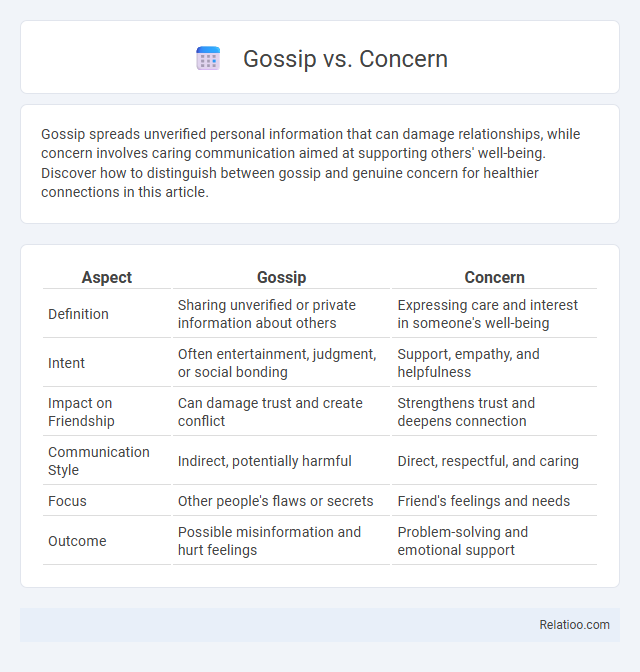Gossip spreads unverified personal information that can damage relationships, while concern involves caring communication aimed at supporting others' well-being. Discover how to distinguish between gossip and genuine concern for healthier connections in this article.
Table of Comparison
| Aspect | Gossip | Concern |
|---|---|---|
| Definition | Sharing unverified or private information about others | Expressing care and interest in someone's well-being |
| Intent | Often entertainment, judgment, or social bonding | Support, empathy, and helpfulness |
| Impact on Friendship | Can damage trust and create conflict | Strengthens trust and deepens connection |
| Communication Style | Indirect, potentially harmful | Direct, respectful, and caring |
| Focus | Other people's flaws or secrets | Friend's feelings and needs |
| Outcome | Possible misinformation and hurt feelings | Problem-solving and emotional support |
Understanding Gossip vs Concern
Understanding the difference between gossip and concern hinges on intent and impact; gossip typically involves sharing unverified or private information that may harm reputations or breed mistrust, while concern arises from a genuine desire to support or help others based on accurate observations. Effective communication requires recognizing when information serves as constructive concern, promoting empathy and problem-solving, rather than descending into gossip, which often undermines relationships and fuels negativity. Distinguishing these behaviors enhances workplace dynamics, fosters trust, and encourages a culture of honesty and care.
Defining Gossip: Characteristics and Motives
Gossip involves sharing information about others that is often unverified and focuses on personal or private matters, serving social functions such as bonding or status negotiation. Its characteristics include informal communication, emphasis on evaluative content, and transmission within social networks. The motives behind gossip range from entertainment and information exchange to social control and reinforcing group norms.
What Is Genuine Concern?
Genuine concern involves expressing sincere empathy and care for someone's well-being without judgment or malice, distinguishing it clearly from gossip, which often spreads unverified or harmful information about others. While gossip focuses on sharing personal details to entertain or influence opinions, your genuine concern prioritizes understanding and support, aiming to help rather than harm. Recognizing and practicing genuine concern fosters trust and healthy relationships by promoting honest communication and emotional support.
The Psychological Reasons Behind Gossip
Gossip often serves as a social tool that fulfills psychological needs such as bonding, information sharing, and social comparison, whereas concern reflects genuine care and empathy towards others' well-being. Gossip can reinforce group cohesion and social norms by spreading information, but it may also lead to negative judgments and misunderstandings. The psychological drive behind gossip includes the desire for social acceptance, status, and managing anxiety about social uncertainties.
Signs Your Conversation Is Gossip, Not Concern
Signs your conversation is gossip, not concern, include discussing personal details without the person present, spreading unverified information, and focusing on negative traits rather than offering help or support. You may notice an emphasis on judgment or entertainment rather than empathy and solutions. Genuine concern involves constructive dialogue aimed at understanding and assisting, whereas gossip thrives on speculation and harm.
The Impact of Gossip on Relationships
Gossip often damages trust by spreading unverified or negative information, leading to misunderstandings and weakened bonds between individuals. Concern, when expressed respectfully, fosters open communication and strengthens relationships by showing care and support. Your awareness of the difference between gossip and genuine concern can help maintain healthy and positive connections with others.
How Concern Builds Trust and Support
Concern fosters trust by demonstrating genuine care for others' well-being, which encourages open communication and emotional support. Unlike gossip, which often damages relationships through judgment and misinformation, concern creates a safe space for honest dialogue and mutual understanding. This supportive dynamic strengthens social bonds and promotes collaborative problem-solving within communities.
Transforming Gossip into Constructive Concern
Transforming gossip into constructive concern involves shifting focus from spreading unverified information to addressing the underlying issues with empathy and clarity. Your approach should prioritize open dialogue and active listening to foster trust and collaborative problem-solving. Emphasizing facts over rumors creates a positive environment where concerns lead to growth rather than conflict.
Setting Boundaries: Avoiding Gossip Traps
Setting boundaries in social interactions is essential to avoid gossip traps that can damage relationships and reputations. Clearly defining topics deemed off-limits and redirecting conversations towards constructive dialogue help maintain a respectful environment. Emphasizing genuine concern over idle gossip promotes trust and emotional well-being within personal and professional settings.
Fostering a Culture of Compassion and Care
Gossip often undermines trust and empathy within communities, whereas genuine concern promotes understanding and support among individuals. Fostering a culture of compassion requires actively choosing open communication and empathy over harmful rumors or idle talk. Encouraging awareness and kindness helps build stronger, more resilient relationships grounded in care rather than judgment.

Infographic: Gossip vs Concern
 relatioo.com
relatioo.com